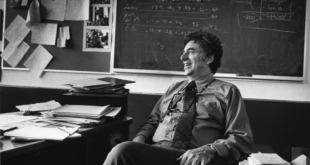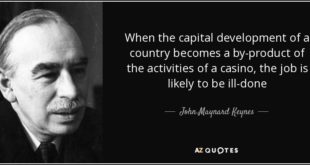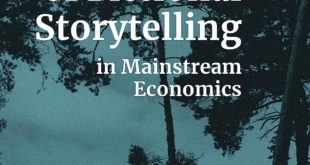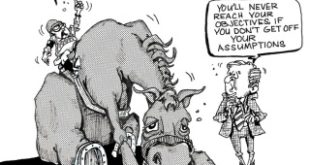.[embedded content]
Read More »Financial instability
The recurring pattern in financial crises is more or less the same. For some reason, a shift occurs in the economic cycle (such as war, innovations, new regulations, etc.) that leads to changes in the profit opportunities for banks and companies. Demand and prices rise, pulling more and more parts of the economy into a state of euphoria. Speculative mania, whether it pertains to tulip bulbs, real estate, or mortgages, becomes a reality. Sooner or later, someone sells to cash...
Read More »Keynes and the casino
Keynes and the casino According to Keynes, financial crises are a recurring feature of our economy and are linked to its fundamental financial instability: It is of the nature of organised investment markets, under the influence of purchasers largely ignorant of what they are buying and of speculators who are more concerned with forecasting the next shift of market sentiment than with a reasonable estimate of the future yield of capital-assets, that, when...
Read More »Jesper Jespersen reviewing my latest book
Jesper Jespersen reviewing my latest book Having read Syll’s book, one cannot avoid wondering how it is that modern mathematical economics still holds such a dominant position in terms of textbooks and economic practice. This is especially so if you consider two things: First, if one peruses the shelves of economic literature of any major bookstore (in London or even Copenhagen), it is clearly books written by dissenting economists which dominate the...
Read More »Econometrics — science based on unwarranted assumptions
Econometrics — science based on unwarranted assumptions Unfortunately, assumption uncertainty reduces the status of deductions and statistical computations to exercises in hypothetical reasoning – they provide best-case scenarios of what we could infer from specific data. Even more unfortunate, however, is that this exercise is deceptive to the extent it ignores or misrepresents available information, and makes hidden assumptions that are unsupported by...
Read More »Courage
In science, courage is to follow the motto of enlightenment and Kant’s dictum — Sapere Aude! To use your understanding, have the courage to think for yourself and question ‘received opinion,’ authority or orthodoxy. In our daily lives, courage is the capability to confront fear, as when in front of the powerful and mighty, not to step back, but stand up for one’s right not to be humiliated or abused. Courage is to do the right thing in spite of danger and fear. As when the...
Read More »Little Honda
.[embedded content]
Read More »Judy in disguise
.[embedded content]
Read More »Quran burnings in Sweden
Quran burnings in Sweden This week, yet another Quran was burned outside a mosque in Stockholm, Sweden. It was, similar to previous burnings, a highly provocative act and one may of course ask why it received permission? Because freedom of expression carries more weight! Turkey’s Minister of Foreign Affairs quickly took to Twitter to condemn “the despicable act in Sweden,” and a spokesperson for Turkish President Recep Tayyip Erdoğan stated that tolerating...
Read More »The inherent epistemological limitation of econometric testing
The inherent epistemological limitation of econometric testing To understand the relationship between economic data and economic phenomena, it is helpful first to be clear about what we mean by each of these terms. Following Jim Woodward (1989), we can characterize “phenomena” as features of our experience that we take to be “relatively stable” and “which are potential objects of explanation and prediction by general theory.” The phenomena themselves are in...
Read More » Lars P. Syll
Lars P. Syll






